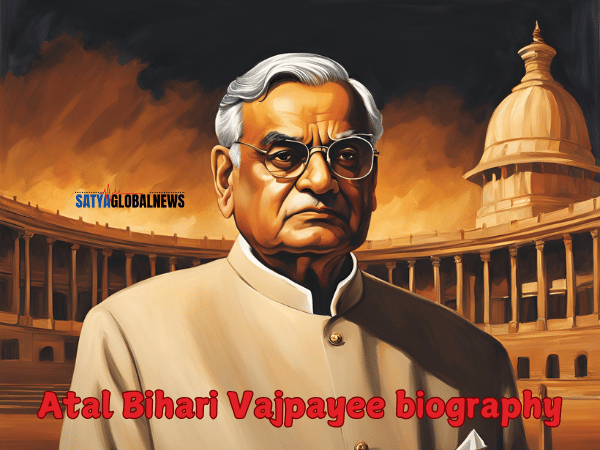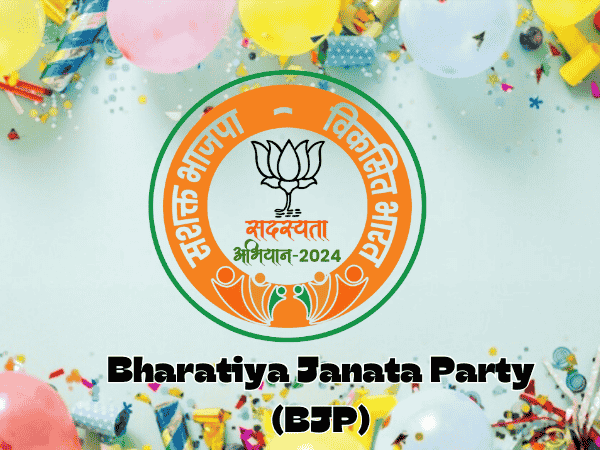It seems like you might be asking for a description or summary of Atal Bihari Vajpayee’s life. Here’s a concise summary:

Atal Bihari Vajpayee: A Visionary Leader
Atal Bihari Vajpayee (1924–2018) was one of India’s most respected and influential political leaders, serving as the Prime Minister of India three times. Known for his eloquent speeches, diplomatic skills, and statesmanship, Vajpayee played a pivotal role in shaping India’s modern political landscape. He was instrumental in leading India through significant events like the 1998 nuclear tests and the Kargil War, showing resolute leadership.
His tenure as Prime Minister (1998–2004) marked a period of economic growth, infrastructural development, and a focus on national security. Vajpayee’s legacy also includes a strong commitment to diplomacy, most notably in his attempts to improve relations with Pakistan. A poet and a passionate orator, he was admired for his vision, pragmatism, and ability to unite India during times of challenge.
Even after retiring from active politics, Vajpayee remained a guiding figure for his party and the nation, earning the Bharat Ratna in 2015 for his exceptional contribution to Indian politics and society.
Atal Bihari Vajpayee: A Comprehensive Biography
Full Name: Atal Bihari Vajpayee
Date of Birth: December 25, 1924
Place of Birth: Gwalior, Madhya Pradesh, India
Date of Death: August 16, 2018 (aged 93)
Place of Death: All India Institute of Medical Sciences (AIIMS), New Delhi, India
Nationality: Indian
Political Party: Bharatiya Janata Party (BJP)
Profession: Politician, Poet, Orator
Spouse: Never married
Parents: Krishna Bihari Vajpayee (father), Krishna Devi (mother)
Early Life and Education
Atal Bihari Vajpayee was born into a family with a strong sense of public service. His father, Krishna Bihari Vajpayee, was a school teacher, and his mother, Krishna Devi, was a homemaker. The family hailed from a small village near Gwalior. Vajpayee grew up in a politically charged environment, which likely influenced his later career in public service.
Vajpayee was an exceptionally bright student and showed an early interest in literature and public speaking. He completed his schooling in Gwalior and then moved to Delhi University, where he earned a Master’s degree in Political Science from the prestigious DAV College. He was deeply influenced by nationalist ideas, especially those of the freedom movement and social justice.
READ MORE :-Narendra Modi: Full Biography of India’s 14th Prime Minister
Early Political Involvement
Vajpayee’s journey into politics began at a young age when he joined the Rashtriya Swayamsevak Sangh (RSS) in the late 1940s. The RSS, a right-wing Hindu nationalist organization, played a significant role in shaping his political ideology. He became a full-time pracharak (campaigner) for the RSS and was associated with its various activities aimed at promoting national unity and Hindu cultural values.
In 1951, Vajpayee became one of the founding members of the Bharatiya Jana Sangh (BJS), which was the precursor to the Bharatiya Janata Party (BJP). The Jana Sangh was formed by Syama Prasad Mukherjee, and Vajpayee’s association with it laid the foundation for his long political career. He was soon recognized for his eloquence and oratory skills.
Rise in National Politics
In 1957, Vajpayee entered the Indian Parliament as a Member of Parliament (MP) from the Lucknow constituency. His maiden speech in Parliament, which focused on India’s foreign policy, earned him immediate recognition. Over the years, his reputation as a skilled orator and writer grew, and he became known for his ability to articulate complex issues in a simple yet powerful manner.
Vajpayee’s political career continued to rise through the 1960s and 1970s. He was known for his firm stance on national security and defense issues, as well as his support for India’s nuclear program. He was also a prominent critic of the then-Prime Minister Indira Gandhi, especially during the Emergency (1975-77), which led to the imprisonment of several political leaders, including Vajpayee.
In 1977, following the fall of the Indira Gandhi government, Vajpayee became part of the Janata Party, a coalition that formed the government. He was appointed as the Minister of External Affairs in the Janata Party government. His term in office was marked by his emphasis on strengthening India’s foreign policy, and he advocated for a balanced relationship with both the Western world and the Soviet Union.
First Term as Prime Minister (1996)
In 1996, following the general elections, the Bharatiya Janata Party (BJP) emerged as the largest party in the Lok Sabha, but it did not have a clear majority. Vajpayee was sworn in as the Prime Minister of India on May 16, 1996. However, his government lasted only 13 days because he could not secure enough support in Parliament, forcing him to resign. This was his first term in office, and although brief, it marked the beginning of his political ascendancy.
Second Term as Prime Minister (1998-2004)
In 1998, following another general election, Vajpayee became the Prime Minister for the second time. This term, which lasted from March 1998 to May 2004, is often considered one of the most pivotal periods in modern Indian history.
Key Achievements and Contributions:
Pokhran Nuclear Tests (1998):
One of the most defining moments of Vajpayee’s second term as Prime Minister was the successful nuclear tests conducted by India in May 1998 in Pokhran, Rajasthan. India tested five nuclear bombs, which were a major breakthrough in India’s defense capabilities. Vajpayee’s decision to go ahead with the tests was controversial but also seen as a bold move that asserted India’s position as a regional power.
Economic Growth and Infrastructure Development:
Vajpayee’s government focused on economic reforms, leading to significant growth in India’s GDP. His administration also embarked on large-scale infrastructure projects, including the construction of the Golden Quadrilateral, which is a network of highways connecting major cities like Delhi, Mumbai, Kolkata, and Chennai. This was aimed at boosting trade and connectivity across the country.
Foreign Policy and Diplomacy:
Vajpayee’s tenure was marked by efforts to improve India’s relations with its neighboring countries, particularly Pakistan. In 1999, he made a historic bus trip to Lahore, Pakistan, where he met then-Pakistani Prime Minister Nawaz Sharif in an effort to normalize relations between the two countries. However, the Kargil War later that year hindered these efforts. Despite the conflict, Vajpayee remained committed to peace with Pakistan.
Kargil War (1999):
The Kargil War was a brief but intense conflict between India and Pakistan over the Kargil region in Jammu and Kashmir. Vajpayee’s leadership during this time was marked by a combination of military action and diplomatic efforts to maintain peace and stability in the region. India successfully repelled the Pakistani forces, and the war ended in India’s favor.
Internal Security and Nationalism:
Vajpayee’s government took a firm stance on national security. His administration introduced several measures to curb terrorism, particularly in Jammu and Kashmir, and made significant investments in defense and intelligence.
Social Reforms:
Vajpayee’s government also made significant strides in social policies. It emphasized poverty alleviation programs, rural development, and expansion of healthcare and education. Under his leadership, India made strides in improving its technological and scientific capabilities.
Third Term as Prime Minister (2004)
In the 2004 general elections, the BJP, under Vajpayee’s leadership, faced an unexpected defeat. The Congress Party, led by Sonia Gandhi, won the majority, and Manmohan Singh became the Prime Minister. Vajpayee’s defeat in 2004 marked the end of his tenure, but his leadership during his time in office had solidified his place as one of India’s most influential politicians.
Later Years and Legacy
After his time as Prime Minister, Vajpayee retired from active politics due to health issues. He spent his remaining years in relative seclusion, although he continued to be regarded as a statesman. He became a guiding figure for the BJP and continued to inspire political leaders across the nation.
Vajpayee’s legacy is characterized by his statesmanship, diplomatic skills, and commitment to India’s growth and security. He remains one of the most respected and admired leaders in Indian history. He was awarded India’s highest civilian honor, the Bharat Ratna, in 2015.
Personal Life
Vajpayee was known for his humility and simple lifestyle. Despite being one of the most powerful men in the country, he never sought the limelight. He was deeply religious but followed a personal path of spirituality rather than institutionalized religion. Vajpayee never married, and his personal life remained relatively private.
Death and Tributes
Atal Bihari Vajpayee passed away on August 16, 2018, after a prolonged illness. His death was widely mourned, with tributes pouring in from across the world. Leaders from all political parties, as well as international dignitaries, praised his leadership, vision, and contributions to India’s growth.
Conclusion
Atal Bihari Vajpayee’s career was defined by his ability to rise above political differences and his commitment to the welfare of the nation. His leadership during critical moments in Indian history, including the nuclear tests, Kargil War, and economic reforms, left an indelible mark on the country. He was a visionary, a poet, a politician, and a true statesman, and his contributions continue to shape India’s political and social landscape today.



